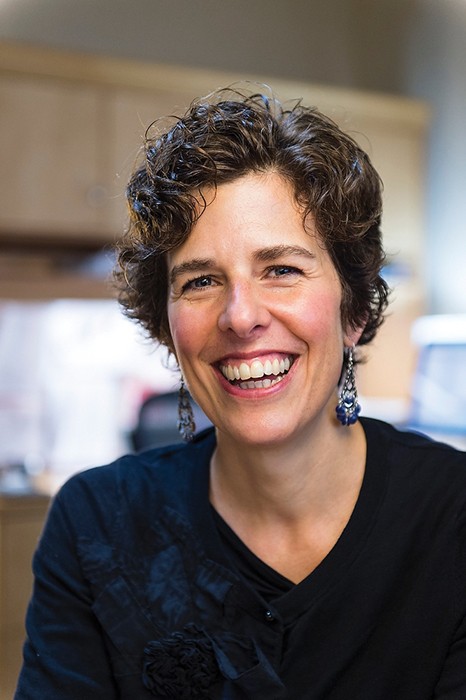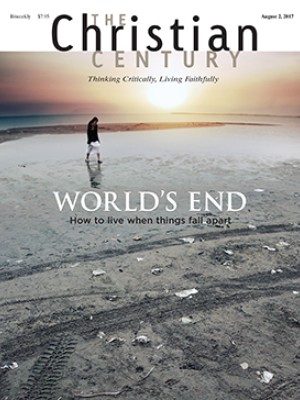A political scientist tries to understand her state's rural residents
“The perception in small-town Wisconsin of being disadvantaged may not be accurate, but it’s not ridiculous, either.”

Political scientist Katherine J. Cramer decided to explore the political divide in her home state of Wisconsin by talking to people at gas stations, coffee shops, and churches in small towns across the state. She learned that rural residents were deeply suspicious of the university and the government and what they perceived as urban elites responsible for the economic and social woes of their communities. Her 2016 book is titled The Politics of Resentment: Rural Consciousness in Wisconsin and the Rise of Scott Walker. Cramer teaches at the University of Wisconsin at Madison.
You titled your book about rural consciousness The Politics of Resentment. Why is resentment the right word rather than, say, anger or fear?
I think anger and fear are part of it, but resentment captures the feeling these people have of not getting their fair share and of being ignored and disrespected. It reflects the slow-burning sense of always being disadvantaged and one step behind.
Read our latest issue or browse back issues.
Is the resentment expressed by people in white rural communities different from that expressed by low-income urban blacks or Latinos?
In some respects what I heard is very similar to what people in cities say: those in charge don’t listen to people like me or people in my community, they’re not familiar with what it’s like to live around here, they’re not giving us the stuff we need to get ahead. But there are differences. The resentment I heard is specifically related to the differences people perceive between rural spaces and urban ones, and it is tied to the particular challenges people in rural places experience, such as lack of economic recovery since the recession and lack of access to broadband. Obviously, racial minorities in urban places face significant challenges, too, but the manner in which they are expressed might be tied to divides between neighborhoods, not between rural and urban.
Why haven’t social scientists and others paid much attention to rural people?
Partly because they are a relatively small number. Depending on how you look at it, about 17 percent of folks in the country live in a rural area. And partly it’s because media centers are mostly in urban areas. Rural stories just aren’t that familiar.
Rural Wisconsinites perceive that government programs disproportionately favor urban people, but the data suggest that isn’t true. Where does the perception come from?
You can look at how much tax people pay and how much they get back county by county and on a per capita basis and conclude that rural people are getting at least their fair share if not more.
But folks don’t see the charts or the analyses. They see the poverty and unemployment around them. And they see, whether from movies, TV shows, or the news, that there is a lot of wealth out there and that it’s primarily in urban areas. And in Wisconsin, people see a lot of tourists from urban areas who have money for boats and vacation homes. Their perception of being disadvantaged may not be accurate, but it’s not ridiculous. It’s founded in experience.
You write about how elite institutions are mistrusted by the rural people you interviewed, and the University of Wisconsin is one of those institutions. How could that suspicion be overcome?
I don’t think you can overcome it through an advertising campaign. It has to come through spending time with people, investing in relationships, and conveying through actions that you care. When faculty from the university go out into the state to do research, it would make a difference if they paused to explain what they are doing and asked local people for their insights. I write in the book about people who expressed bewilderment at some of the experiments going on in their lakes and forests. Someone doing a study on bass fishing might consider that the local people would be curious about the little red flags put out in the lake.
The University of Wisconsin–Madison has started a program called the Univercity Year in which the university establishes a relationship with one municipality, asks about the issues it’s tackling, and then connects those needs with courses so that students and instructors can collaborate with that community to do work that it would not have been able to afford otherwise. That’s one effort that is in its early stages.
If a politician came to you for advice about reaching white rural Wisconsinites on a public policy issue, what would you say?
I would say you have to listen carefully to what people are telling you. There is no way around the task of explaining, explaining, explaining, and listening, listening, listening. The listening and the explaining go together. You can give people all the information in the world, but if they perceive it as coming from an entity that really doesn’t care about them or understand the challenges they’re facing, they’re not going to pay attention.
People in rural areas often do work that is different from the kind of work urban people do. Logging and farming are different from working at a computer. How much does that obvious difference contribute to the cultural differences you’ve encountered?
It is hard to parse what comes first, our myths about hard work or our actual understanding of what we value in work. The contrast between working with your hands or body all day and sitting at a desk is real to many people and distinguishes whether or not you’re working hard. I found much resistance to the idea that working at a computer is hard work. People would wonder, How can it possibly be hard work if you get to sit all day?
In your exploration of rural life, how much did churches serve as a resource or reference point for people?
The people I spent time with talk less about religion than did the people in the Louisiana community studied by Arlie Hochschild in Strangers in Their Own Land, but it was still an important reference point. A lot of times a church is on par with the local high school in providing a sense of community, a gathering place, and a way to network. I often heard general references to the decline in churchgoing. People also had the stereotype that people in the city are irreligious.
As you think about bridging the distances and healing the resentments that are revealed in the book, do you see any reasons to be hopeful?
What gives me hope is that more people than I ever imagined are reading my book and wanting to talk about it, which suggests both a desire to understand each other and a valuing of listening. My experience in doing the research gives me a lot of hope too, because though I walked into many groups representing much of what they resented, they were willing to welcome me and let me sit there and listen and ask questions.
Do you personally do anything differently as a result of your research?
Probably the biggest change is that when I hear people start talking about the country bumpkins who voted for Trump, I try to help them to see things differently. And I think I’m more mindful of my own relative wealth.
Is your research on rural life leading you to any new lines of investigation?
I am checking in with the people I interviewed to consider how their lives are changing, if at all, under the Trump administration and to see if their orientation to politics is changing. I’m also curious about young people in rural communities, who didn’t feature much in my sample.
As a result of the book, I have received a lot of correspondence from people that I’ve never met—long emails from people telling me their stories, some heartbreaking, some just fascinating. I’m trying to figure out how to honor this material and learn as much as I can from it.
A version of this article appears in the August 2 print edition under the title “Understanding rural resentment.”







